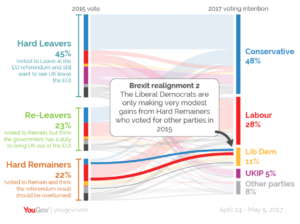It’s easy to forget that the Lib Dems were once a serious force in British politics. Two short years ago they formed part of the coalition government. In 2010 during the height of “Clegg-mania” the Lib Dems were briefly the UK’s most popular party and serious commentators were considering the possibility of a Lib Dem government.
Much has changed since those heady days and the Lib Dems have face repeated annihilation in European Parliament, Local Government, Regional Assembly and parliamentary level.
Tim Farron, the Lib Dem leader, is fighting this election under the banner of a Lib Dem “Fightback”. This campaign took a heavy blow earlier this month with the Lib Dems managed to lose seats in the local government elections despite the previous 2013 poll being a catastrophe for the party. The poll numbers are little better. The majority of polls put the Lib Dems at between 9%-11% which is imperceptibly better than their 2015 nadir.
I’m predicting that the General Election on June 8th will be no different and the Lib Dems will be held to a handful of gains in their former heartlands. The bookmaker Paddypower is predicting a tally of 13-14 seats. I believe this would be a good night for the Lib Dems.
At the heart of these disappointing numbers is the central plank of the Lib Dems General Election campaign namely opposition to Brexit. This was the driving force behind the Lib Dems shock by-election victory in Richmond Park but it doesn’t appear to be paying off at national level.

The latest figures from YouGov (Full analysis: https://yougov.co.uk/news/2017/05/12/forget-52-rise-re-leavers-mean-pro-brexit-electora/) indicate that the Lib Dems are not making the gains they need amongst die hard remainers. Whilst the Tories have managed to hold onto their remain voters from 2015 and consolidate the hard leave vote into a winning coalition the Lib Dems have failed to have the same success amongst remain voters.
There are two factors underpinning this. The first is that a majority of remain voters have reconciled themselves to the fact that the UK will be leaving the European Union and want to see the government make the best possible job of the Brexit process. This type of voter is unlikely to be impressed with the Lib Dems ceaseless criticism of the government’s negotiating strategy and their insistence on a second referendum on the terms of Brexit.
The second factor is that the Lib Dems are facing fierce competition for the die-hard remain vote from regional rivals such as the SNP and Plaid Cymru and with Labour and the Greens in England.
The Lib Dems have a safe place in the UK’s political marketplace. Their emphasis on local campaigning and their competitiveness in both Conservative and Labour heartlands gives them a unique edge and I have no doubt that with competent leadership and sufficient time they will rebuild.
However, this election will likely be a severe disappointment as I don’t feel that the Lib Dems are in a position to reverse the Conservative tide which proved their undoing at the last General Election.
